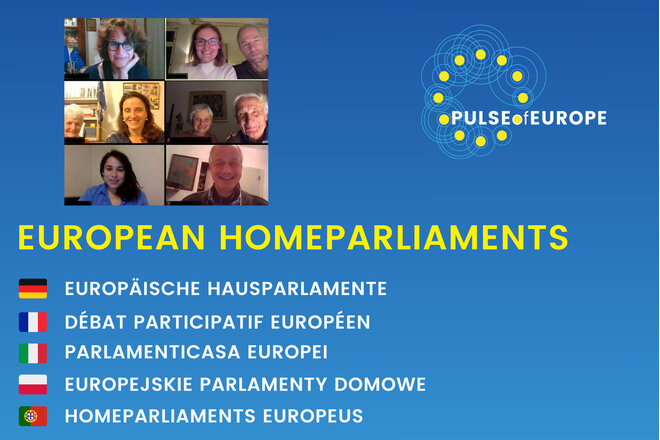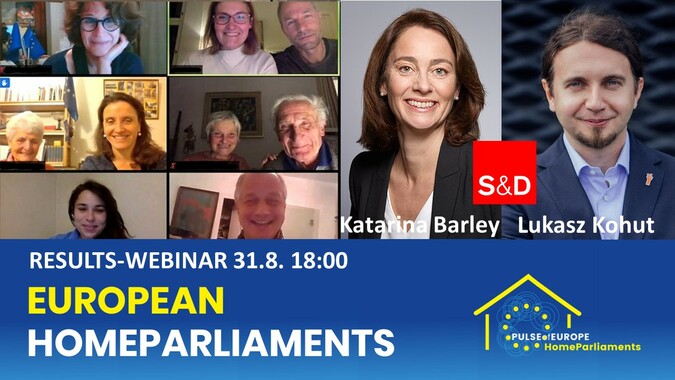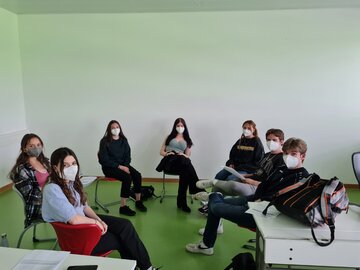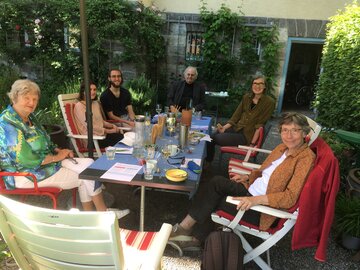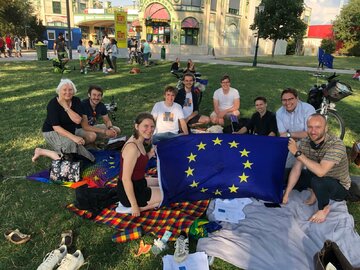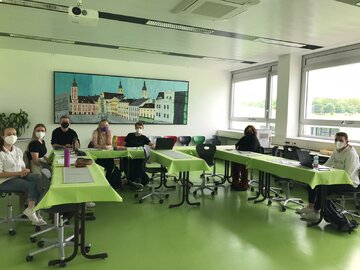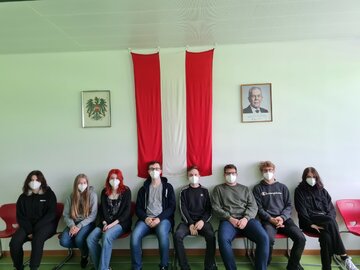Hintergrund
Even 1.5 years after the pandemic started, it is still determining the lives and deaths of people all around the world. The most important tool against the virus is a vaccination. Yet, EU member states are lagging behind the US and the UK in this regard. Lockdowns are restricting EU citizens' rights of freedom and many sectors of the economy are down. The pandemic crisis is shaking the foundations of the European self-perception: freedom of travel, free trade, multilateralism, global solidarity, democracy, and personal rights – to name only a few. According to experts, we expect further pandemics in the future. Against this background, and in order to be better prepared jointly together, we would like to discuss the following questions in the fourth round of our European HomeParliaments:
Teilfragen
1. Should vaccines and vital medical products be produced entirely in the EU in the future to ensure the supply of the EU population?
Hintergrund: The Covid-19 crisis has revealed the EU’s dependence on third countries. There was a lack of protective face masks, protective goggles, overalls and ventilators, which were mainly produced in China and India. Even before the pandemic, essential medicines could often only be delivered in limited supply.
Pro
Medical products save human lives and ensure the functioning of the economy. Therefore, sufficient production capacities should be available within the EU, especially for crisis situations.
If the entire supply and production chain is located in the EU, higher production or quality standards could be enforced. This increases the safety of medical products.
Successful joint economic cooperation projects (e.g., the Coal and Steel Community and the Airbus Group) promote solidarity among the EU member states and thus counteract unilateral action by the individual states.
Contra
Production costs in the EU are usually higher than in other parts of the world. These higher costs for medical products would ultimately be a burden on EU citizens.
The EU's trade model is internationally connected. Self-sufficiency efforts could provoke protectionist reactions from non-EU countries and thus damage the EU's economy and diplomacy.
Setting up production sites takes years and costs a lot of money. It would be faster and cheaper to optimize existing supply chains.
Ergänzungen aus den Treffen
Europe exporting know-how to the rest of the world. help inform citizens about the crucial role that the European institutions played in preventing a worsening of the pandemic in Europe, in particular concerning the vaccination campaign and the health coverage of European migrants in other EU member states.
Europe must act only by taking into consideration that demographically, financially, politically and militarily Asia and Africa are rising, while Europe is ageing and having less and less of an impact on a global scale.
2. Should vital medical products (such as vaccines) only be exported from the EU once European citizens have been supplied?
Hintergrund: Although European companies were subsidized by governments for their vaccine research, far fewer people in the EU have been vaccinated compared to the United Kingdom, for example, due to a lack of vaccines, where a large number of vaccinations were carried out with EU-made vaccines. Not every country exports their locally produced vaccines. The USA and the United Kingdom have exported almost no vaccines so far, however, China has.
Pro
By acting in this way, the EU would only take the same measures as the UK and the USA.
In the event of supply bottlenecks, the well-being of European citizens should be the top priority. Economic interests of companies and global political considerations must take a back seat.
Vaccines subsidized by the EU should aid the local population first and foremost.
Contra
If the EU blocks all vaccines for itself, other countries will stop exporting the necessary ingredients for their production. This would lead to a worldwide hamstringing of research and production capacities.
If no vaccines reach countries outside the EU, new resistant virus variants could emerge there and in turn, threaten EU citizens. A global epidemic can only be solved globally.
The European Union emerged, among other things, as a result of nationalist catastrophes. A "vaccine nationalism" contradicts fundamental European values such as fairness and universalism.
Ergänzungen aus den Treffen
The faster we vaccinate European citizens, the more we avoid lockdowns in the EU
- The vaccination in the EU will contribute to the EU’s economy, thereby eliminating the expenditures on supporting businesses, organizations in pandemic
Europe must give up on its colonial past and post-colonial worldview: a European life is not more important than the life of people in other continents.
Prioritising Europeans getting vaccinated without assuring that the whole world has satisfactory access to vaccines is pure populism and demagogy.
3. Should citizens be allowed unrestricted travel within the European Union after vaccination or proven immunity?
Hintergrund: Studies imply that immunized people only rarely carry a transmittable form of the virus within them, and thereby do not spread it (As of early April 2021). They could, therefore, return to a life like before the pandemic. The EU Commission is already preparing a Green Vaccination Certificate, which is meant to prove one’s vaccination and immunity.
Pro
Being allowed to travel again with a vaccination certificate would be an incentive for some people to get vaccinated. Protection for the entire population (herd immunity) will only be given when about 70 percent of the population has been vaccinated.
Covid lockdowns cause major economic damage, especially in countries that are heavily dependent on tourism. Travel by EU citizens to these countries therefore helps to cushion the economic impact of the pandemic.
Anyone who is vaccinated is no longer a danger to fellow citizens - so the reason to remain in lockdown no longer applies. This makes the freedom to work and travel across borders possible again (fundamental values of the EU).
Contra
Advantages through the vaccination certificate discriminate against people who may not be vaccinated for health reasons or for whom vaccination is not yet available, e.g., children or pregnant women.
Among people who have not yet been vaccinated because of the vaccine shortage, frustration and resentment towards the EU would grow.
Such a vaccination certificate requires linking sensitive health data with personal data and disclosing them to authorities and tourism companies. This could be a first step towards the "health surveillance" of European citizens and thus violate data protection.
Ergänzungen aus den Treffen
European solidarity needs room to develop and that can not happen when the borders are closed
Such extreme socioeconomic motives to encourage people to get vaccinated constitute an indirect obligation to get vaccinated in order to avoid severe socioeconomic impact on our lives (job opportunities, access to culture, entertainment and sport, freedom to travel, less free time etc.). This is an offense to our right to self-determination and to the free development of our personality.
Quellen
- https://ec.europa.eu/info/live-work-travel-eu/coronavirus-response/public-health_en
- https://ec.europa.eu/health/funding/eu4health_en
- https://oecd.org/coronavirus/en/#spotlight
- https://ec.europa.eu/info/live-work-travel-eu/coronavirus-response/emergency-support-instrument/covid-19-clearing-house-medical-equipment_en
- https://www.europeandatajournalism.eu/eng/News/Data-news/The-irresponsible-reliance-of-European-Big-pharma-on-China
- https://ec.europa.eu/commission/presscorner/detail/de/ip_21_1352
- https://www.euractiv.com/section/coronavirus/news/eu-leaders-cautiously-back-vaccine-export-controls-claim-to-be-worlds-main-exporter/?_ga=2.202224401.1094304977.1619181076-1117540662.1619181076
- https://www.tagesschau.de/kommentar/exportstopp-impfstoff-proundcontra-101.html
- https://ec.europa.eu/info/live-work-travel-eu/coronavirus-response/safe-covid-19-vaccines-europeans/covid-19-digital-green-certificates_en
- https://www.dw.com/en/eu-vaccine-passport-an-ethical-and-legal-minefield/a-56747519
- https://www.euronews.com/2021/03/17/european-commission-presents-plans-for-green-pass-for-freedom-of-travel-within-bloc
Auswertung
Should the EU represent European interests more decisively in future pandemic crises?
Zustimmungen 88
Ablehnungen 12
Enthaltungen 25
1. Should vaccines and vital medical products be produced entirely in the EU in the future to ensure the supply of the EU population?
Die Abstimmungsergebnisse setzen sich aus 702 eingetragenen Ergebnissen zusammen.
Tendenz (Median)
Mittelwert
2. Should vital medical products (such as vaccines) only be exported from the EU once European citizens have been supplied?
Die Abstimmungsergebnisse setzen sich aus 698 eingetragenen Ergebnissen zusammen.
Tendenz (Median)
Mittelwert
3. Should citizens be allowed unrestricted travel within the European Union after vaccination or proven immunity?
Die Abstimmungsergebnisse setzen sich aus 695 eingetragenen Ergebnissen zusammen.
Tendenz (Median)
Mittelwert
